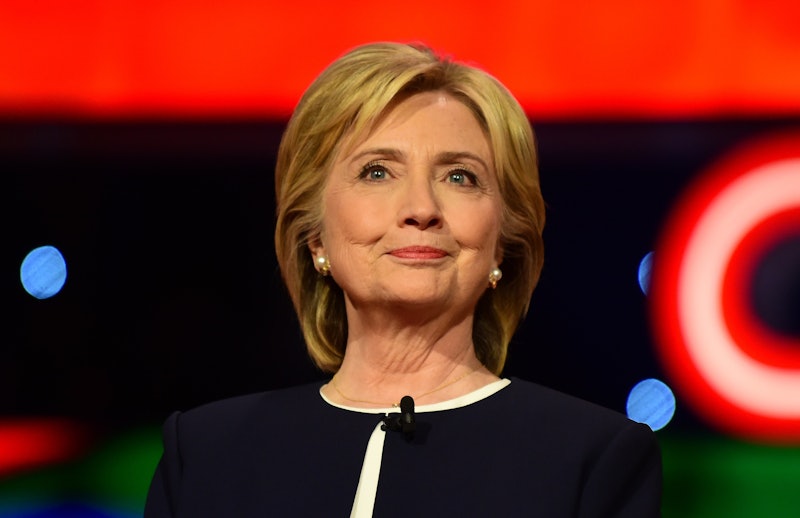News
Hillz Brings Paid Leave Back Into The Spotlight
The Hillz had a lot of fine moments during last night's Democratic debate. But one of her finest? It was probably when she defended her views on federal paid leave policy — a topic none of her fellow candidates really managed to hit on quite so well. And seriously, it's a good thing she did, because we need this conversation to keep going until something gets done. As it stands now, the U.S. does not mandate paid maternity leave for working mothers at the federal level, and we're the only advanced nation in the world that doesn't. And as Clinton urged (in so many words), it's time we step up our game.
The topic of paid leave first came up earlier in the night, when Bernie Sanders snuck it in while talking about what it means to be a democratic socialist, and how his health care policies would benefit both individuals and families. He said:
When you look around the world, you see every other major country providing health care to all people as a right, except the United States. You see every other major country saying to moms that, when you have a baby, we're not gonna separate you from your newborn baby, because we are going to have — we are gonna have medical and family paid leave, like every other country on Earth.
But it was during a more pointed question, asked by CNN's Dana Bash to Clinton, that really brought it front and center: "Carly Fiorina, the first female CEO of a Fortune 50 company, argues, if the government requires paid leave, it will force small businesses to, quote, 'hire fewer people and create fewer jobs. What do you say not only to Carly Fiorina, but also a small-business owner out there who says, you know, I like this idea, but I just can't afford it?"
Not missing a beat, Clinton fired back, and pretty much discredited Fiorina's claims right away. "Well, I'm surprised she says that, because California has had a paid leave program for a number of years," said Clinton. When Bash pressed Clinton that California implements the program on a state level, whereas Clinton is campaigning for nationwide coverage, Clinton quipped that California is "a state as big as many countries in the world." Fiorina has argued that it's not the government's responsibility to mandate paid family leave (though it should be noted that she did praise Netflix for implementing their paid leave program back in the summer).
Throughout the back and forth, Clinton remained steadfast that the U.S. can and should find a way to join the rest of the world in supporting families, and in particular working mothers, who typically take on more childcare responsibilities. Oh, and she also argued that this can be done without straining the economy or digging into the pockets of small business owners. That line of thinking, the candidate implies, isn't singular to Fiorina — it's Republican rhetoric, plain and simple. "This is typical Republican scare tactics. We can design a system that does not put the burden on small business,” she concluded.
Then Clinton made the issue a bit personal — in a move that seemed undeniably authentic, as opposed to strategic and pre-rehearsed, which has been one of her biggest criticisms so far. She said:
I remember as a young mother having a baby wake up who was sick, and I’m supposed to be in court because I was practicing law. I know what it is like. And I think we need to recognize the incredible challenges that so many parents [have], particularly working moms. We need to get a consensus through this campaign, which is why I’m talking about it everywhere I go and we need to join the rest of the advanced world in having it.
It wasn't exactly a mic-drop moment, like when Anderson Cooper asked her if she'd like to respond to Lincoln Chaffee's comments about her emails and she awesomely said "No." But it rang of sincerity from a working parent who's been there. And that was certainly not lost on the working parents who were watching.
But is it any wonder? Right now, the Family and Medical Leave Act (FMLA) is all we really have on a federal level. The law, enacted in 1993, grants 12 weeks of unpaid family leave for full-time workers who have either just had a baby or have a sick family member. Working parents are therefore at the mercy of their employers when it comes to paid leave, which varies by company and state-to-state, and often only applies to the mother. There are lots of holes to this one, too. For instance, the law doesn't apply to part-time workers, and lower-income parents who can't afford to take 12 weeks off after having a baby often return right away. A 2012 report by the U.S. Department of Labor found that this led to 15 percent of working parents who took unpaid or partial leave for a baby having to resort to public assistance. And while we might be hearing a lot lately about the Netflixes and Microsofts out there, the truth is that only 12 percent of U.S. companies offer a paid leave policy. Twelve percent.
Based on these stats, it's easy to see why a candidate's stance on the matter is so important. An estimated 3.9 million babies are born each year in the U.S., which means millions more Americans will be entering into parenthood at the same time. I'm willing to bet then that a federally mandated leave policy would certainly be music to a lot of ears.
Image: Getty
